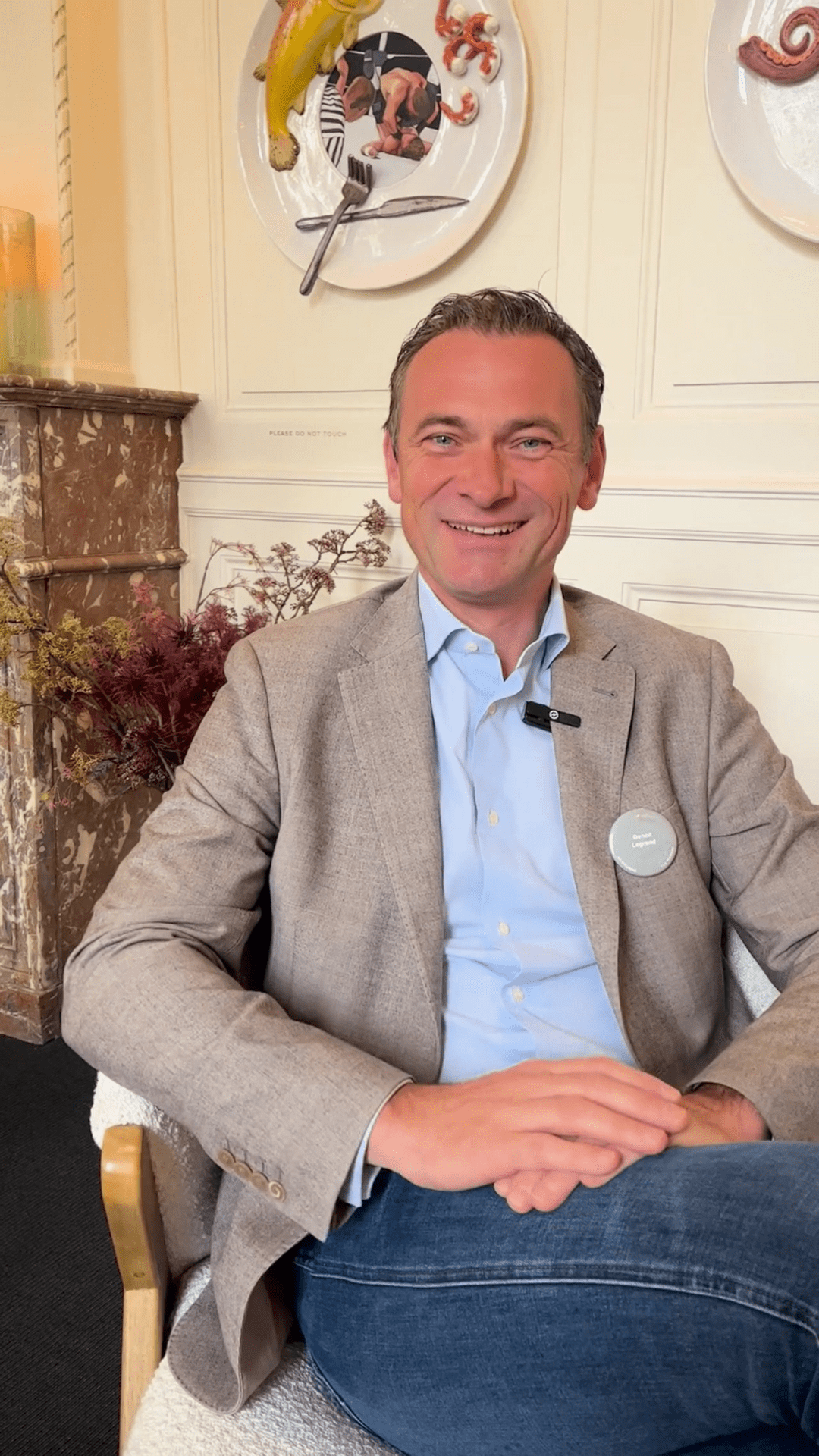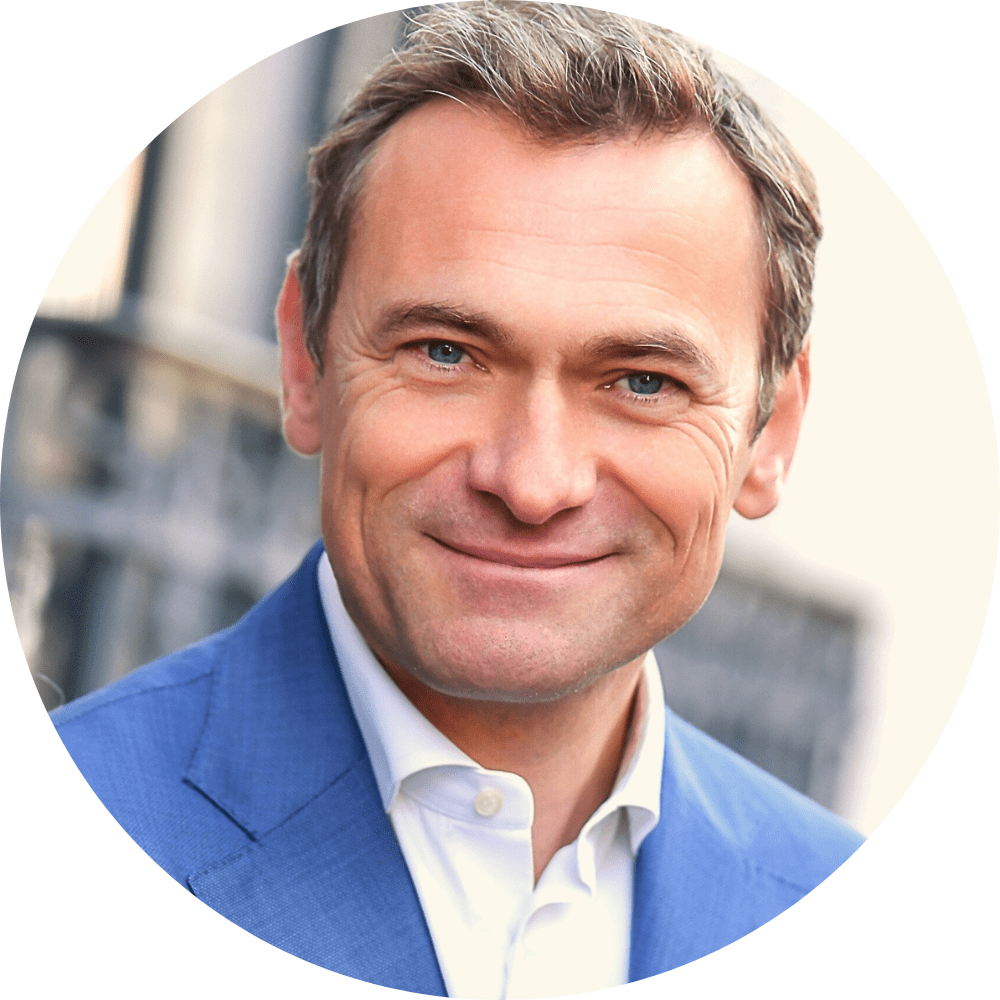A CONVERSATION WITH:
Benoît Legrand
Business leader, psychogenealogist, former CEO and Chairman
🌍 Paris, France
A CONVERSATION WITH:
Benoît Legrand
Business leader, psychogenealogist, former CEO and Chairman
🌍 Paris, France
Last November, TheMerode Club brought together seasoned executives from the government, business, civil society, and academic sectors to reflect on wellbeing at the individual, collective, and planetary levels.

Benoît Legrand, a visionary business leader with over 25 years of experience in various C-level positions in the European financial sector, joined The Wellbeing Summit Brussels to share reflections from his career in business and newfound venture as a psychogenealogist.
Speaking on a panel about the impacts of intergenerational trauma with The Wellbeing Project’s co-lead, Aaron Pereira, and Katherine Milligan, Director of the Collective Change Lab, Benoît encouraged changemakers to connect the individual with the organizational by asking themselves: how do my traumas impact my leadership style?
We sat down with Benoît to dive deeper into this topic. Drawing on his business and personal experiences, hear from Benoît about why acknowledging and addressing one’s traumas is an essential leadership skill, plus encouragement for leaders to start this important journey.
“It should be part of the essentials of leadership. Because, knowing your own darkness is, I think, the best method for dealing with the darkness of other people. You cannot have change, have people change, and change yourself before you accept that something is really wrong. Right?”
Trauma, for me, is something which we all go through, and something absolutely necessary to be aware of to give the best of yourself and find your place in this world. The idea of “trauma” might give or have a sense of drama, which is of course very true when we think about those very macro-level traumas which have affected large populations or very deep traumas that some individuals can go through. Yet, trauma goes also into more subtle dimensions of things which traumatize you. You can be affected by what happened to you consciously, but also by what happened in your family, school, community, country, continent, or race. These impacts are being inherited, which we see now from an analytical and empirical point of view. So in a way, we are all traumatized. But it’s okay. The point is merely for every one of us to just first acknowledge it, dare to look at it and think beyond everything which we know consciously.
I’ll always have in my mind what Carl Jung said, “who looks outside, dreams, and who looks inside, awakes.” I’ve learned that from this process. I thought just looking outside would make me smart and intelligent. But the awakening comes from looking inside of myself, not being scared and not being afraid. By facing reality, we can unlock a lot of situations.
Leaders care about so many people and they don’t want to let anyone down. But they should realize that if they go down themselves, they let everyone down.
It’s just essential to face your trauma as a leader. You will notice anyone who’s just going out there and showing his vulnerability, just making himself more human. As a leader, if you effectively radiate this positive energy, then it diffuses around the organization. It’s a bit like a pendulum: if at the very top, the positive radiation is there, the radiation at the bottom will be just proportionate. And if the organization is big, or you go to a company or a country, then the impact you can have is just immense. So it’s our own responsibility to think for ourselves: What do I want to be in this world? Do I want to be an agent of positive radiation? Or do I still want to keep all this hatred and and violence and fear and negative energy in myself and overload the world with that right?
Let’s say, okay, we know it’s important to eat. We know it’s important to sleep. We know it’s important to read good things. But do we take, as leaders, the time to step back to sit with someone and just have a conversation? Get a couple of things out, talk and discuss, just to say, “Well, I’m not alone here, right?” and to take care of yourself? It’s fantastic because leaders care about so many people and they don’t want to let anyone down. But they should realize that if they go down themselves, they let everyone down. So having a preventative strike, taking a step back, breathing it, having a discussion and looking at your psychological health is very important. But that can be very hard for leaders, to say, “I need to ask for help.” I personally have been very bad at this.
I’ll just testify what I’ve been through. I was having a very intense business life. I was managing teams all over the world and travelling 80% of the time. I was also under heavy stress, with a new CEO that was misaligned with what I was thinking. There was a combination of things, including me having worked like hell for the last 20 years, going all over the place, with pressure from left to right. And at one point, my body – because my brain didn’t want to understand it – sent the signal: stop. My heart gave me a very strong signal that I needed to stop. I stayed in the hospital for four or five days, where I realized that I went over a limit because I was not sufficiently courageous to face my limits and ask for help.
I kept denying reality. I thought, because I’ve been through so many challenges and successes as a leader, I’m going go through it this time also. I’m not going to ask for help or say I’m vulnerable. But the second problem is once you effectively realize you’re not OK and you might not manage to deal with the situation, there’s some kind of taboo. So you just keep fighting on your own. This is what leaders might face. I know that in France, about one out of two leaders or entrepreneurs is close to being in burnout. One out of two, which is just dramatic.
You, as a leader and manager, have been doing nothing else than daring right? You have been taking risks. This is what you do daily. But there are also risks to take about yourself so you can see a couple of things. It’s okay. You will be more powerful by doing it. And really, what do you have to lose? Even if you’re 40, 50, 60, you still have life to live. What do you want to do with it? So look forward and say, “Is it worth taking the time and challenging myself just to try to be at the best place can be on this planet?” If you take that time, once you’re there, nobody can stop you.
Look forward and say, “Is it worth taking the time and challenging myself just to try to be at the best place can be on this planet?” If you take that time, once you’re there, nobody can stop you.
And the systemic approach is so powerful. We live in systemic environments: whatever changes something which influences something which changes, and so on. Once you start talking about something, you see things happening around you. The power of communication, daring to put things on the table and explain things, starts to unlock a lot of things that can bring a lot of peace.
But do this in a secure environment: bring safety and security around you. It can be hard, but if you do it with the right spirit of care, love, and positivity, it will come right back to you.

Benoît Legrand is a visionary business leader with over 25 years of experience in various C-level positions across multiple countries. Throughout his career, Benoît’s driving conviction has been centered around putting people at the heart of the company. He believes in genuine care for employees and customers to achieve lasting success. Having served as CEO of ING Direct France, Country CEO of ING France, and Chairman of ING France, he demonstrated his dedication to innovation by spearheading ING Ventures, the EUR 300m Corporate Venture Capital arm. After leaving ING in 2021, Benoît now advises organizations on innovation and transformation. He holds degrees in International Relations and Economics. Belgian and based in France for over 10 years, he has lived in 8 different countries and speak 5 languages.
Watch the first virtual convening in our webinar series hosted by The Wellbeing Project and the Collective Change Lab. You can also visit our new hub for research and stories on intergenerational trauma. Together, we explore how we can move from trauma-informed to healing-centered ways of working for systemic change.


Non classé


Non classé